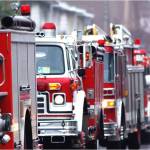26 Nov Fires Spark Needed Landlord-Tenant Discussions

The recent tragedies of lost lives in Portland and destroyed property in Biddeford due to fires have landlords and tenants talking about safety. The Southern Maine Landlord Association (SMLA) recently met in Portland to take a deeper dive into both building code standards required of landlords as well as tenants’ vigilance about safety in their rented apartments. In Northern New England, about half of all multi-unit dwellings are 50 years or older and require safety updates. So, what are the expectations of living safely in a multi-unit building?
Perhaps the strongest message to landlords was offered by panelist Bill Exley of Clark Insurance who said meeting or exceeding the expectations of the insurance companies may be a higher standard than simply meeting local or state building codes.
“When an insurance company conducts an inspection, their interests are in the safety of the occupants and the integrity of the property. Why? Because they are accepting the financial risk of something going wrong and they are extremely motivated to avoid that risk.
“Most insurance property inspections result in a list of recommendations to correct hazards, meet codes or simply improve safety. But insurance professionals can’t see everything so whether you are a landlord or a tenant, if common sense suggests that a problem exists, then it needs to be quickly addressed,” said Exley.
Exley shared the evening panel with Josh Fifield of Clark Insurance, Portland Fire Department Captain David Petruccelli, Mark Cummings of Fire Risk Management and association president Brit Vitalius.
Vermont Mutual, one of the region’s leading insurance companies for rental properties calculated that nearly 11 percent of their claims in 2011 were due to fires. The most frequent causes included
- Chimney fires (37%)
- Kitchen cooking (14.5%)
- Smoking (6.8%)
- Structural wiring (5.5%)
While cooking, smoking and other tenant activities account for about a third of fire-related claims, 42 percent of fires are caused by structural issues often unseen to apartment dwellers.
Insurance companies recommend a number of practical measures for landlords to help prevent fires, improve tenant safety and protect tenant property. Checklists can be found at the SMLAmaine.com web site.
- Conduct, at minimum, an annual inspection with a written log for all smoke/CO detectors
- Require renter’s insurance of tenants when permissible ( a lot of coverage at a low cost)
- Install stove top fire suppression units and fully charged fire extinguishers in hallways and units
- Establish an evacuation plan for tenants with exit signs and secondary escape routes
- Explicitly prohibit smoking, candles and incense in the rental agreement
- Maintain lint-free clothes dryers
- Install ground fault circuit interrupter (GDCI) outlets for all appliance receptacles
- Be certain apartment numbers are boldly posted on all doors to enable swift fire/rescue response time
If the property has a sprinkler system, landlords should regularly ensure all control valves are in the open position; sprinkler heads are free of dust, paint or residue; that nothing is stacked higher than 18-36 inches from sprinkler heads; and nothing is being suspended from sprinkler pipes. Most importantly, a recorded inspection should be done quarterly by a knowledgeable professional to certify the system meets insurance company and local fire department requirements.
In addition, tenants need to use common sense in both their apartments and the common areas.
- Never leave cooking food unattended
- Never grill on decks/porches and always 10-20 feet from the building
- Do not smoke or use candles or incense in your apartment
- Keep space heaters at least three feet from anything that could catch fire and do not operate space heaters when asleep.
- Keep stairs and hallways completely free of storage, bikes or furniture
- Place smoke/CO detectors in bedrooms and change batteries twice a year
- Always have at least two means of easy escape from your unit
- Never rent or occupy an illegal unit (e.g. basements or attics that lack authorized habitation)
Though not related to fire, about 40 percent of claims reported to Vermont Mutual in 2011 were caused by the weight of ice and snow. These also pose a risk for tenants as porches and decks used for egress most often are compromised by heavy snow and ice.
Finally, tenants should know their rights under a rental agreement when it comes to proper safety precautions. If a landlord has been unresponsive to safety concerns, the tenant should notify their local town office and state fire inspector. Landlords, similarly, should take action if tenants compromise safety systems or refuse to behave according to their rental agreement. Ultimately, being safe is in the best interests of all concerned.



